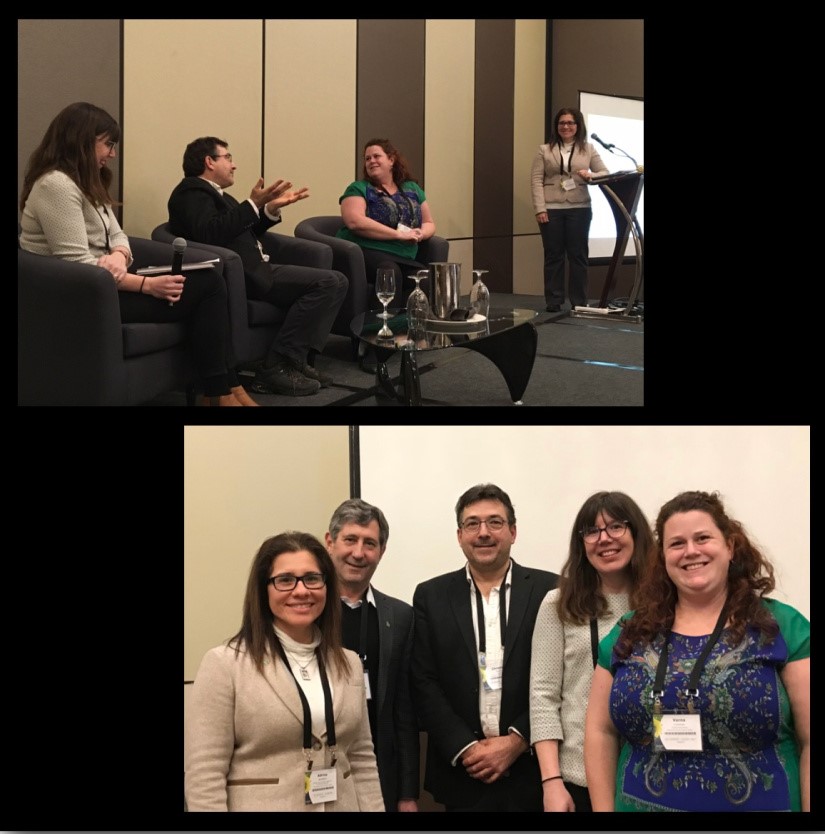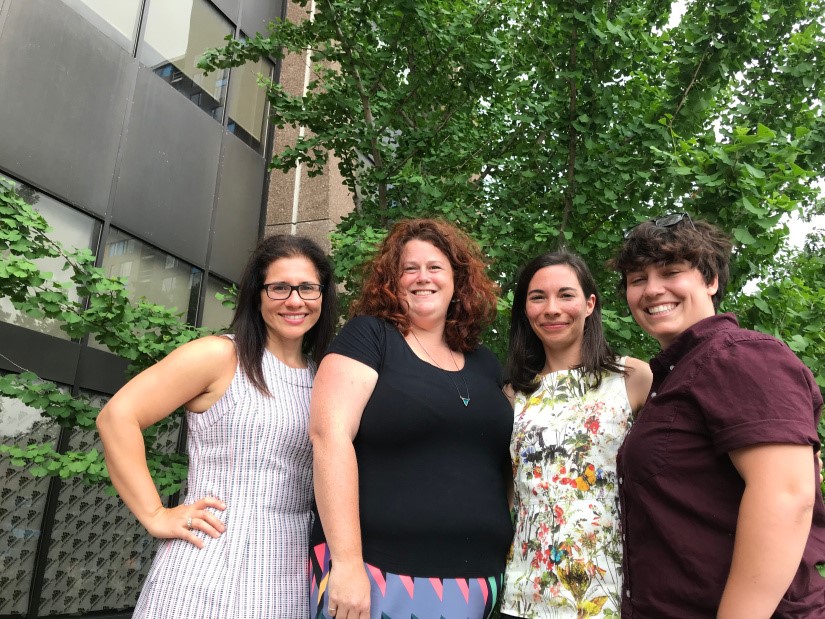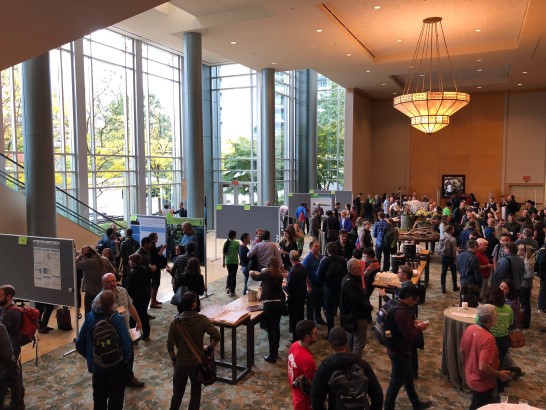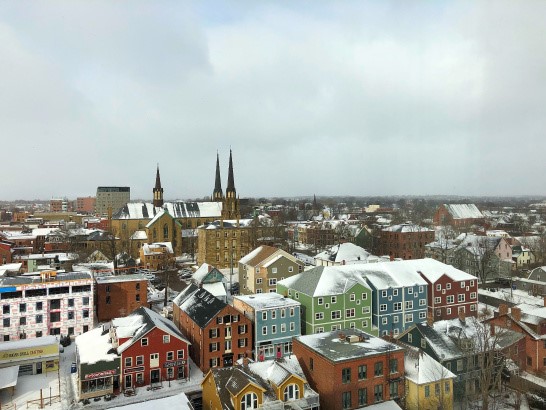To commemorate my last day before starting my maternity leave, I wanted to follow up on my article from May 2018, Over the Years We Grow: National Scale Progress in Engagement and Research at Tree Canada. Over the past year, we have accomplished several exciting projects within the Engagement and Research pillar of programs at Tree Canada. If you haven’t read my first article, please check it out to get an overview of these important leadership initiatives in Canadian urban forestry – this current article offers a quick update on my activities with Tree Canada since then.
What did we accomplish in 2018/2019 in Engagement and Research at Tree Canada?
The Canadian Urban Forest Network (CUFN):
- We’re now up to 975 members on the CUFN email listserv. If you’re not a member, please join here (it’s free!) to share stories, projects, successes, and challenges—ask questions and inspire others. We’ve seen more activity on the list, and have received positive feedback from our members that this is a reliable source and method for sharing information. Stay tuned: Tree Canada’s Communications team is working on a new listserv platform to track membership.
- Our Canadian Urban Forest Network (CUFN) Steering Committeeis planning regional workshops across the country in 2019 to share knowledge and discuss opportunities and challenges in urban forestry. Feedback from our 2018 CUFN member survey (Bardekjian & Chiriac, 2018) has helped the CUFN Steering Committee’s efforts to engage the regions more deeply.
- We curated and hosted another successful urban forestry e-lecture series in partnership with the Canadian Institute of Forestry (March 2019). The theme was “Society, Diversity, and People” – recorded presentations may be accessed here:
- Tenley Conway, University of Toronto; “Supporting Urban Tree Diversity on Residential Property.”
- Susan Day, University of British Columbia; “The Challenge of Interdisciplinarity in Urban Forestry.”
- Christian Messier, Université du Québec en Outaouais (UQO) et Montréal (UQAM); “Praise to diversity: a functional approach to increase resilience of the urban forest.”
- Our CUFN Steering Committee is continuing to share local and regional stories of urban forestry practice and activities through their articles, which are shared on the CUFN listserv and Tree Canada’s blog.
- In the interest of raising awareness and sharing urban forestry knowledge, we’ve delivered numerous presentations and publications at various conferences, both domestic and international, including curating and hosting panels at the Federation of Canadian Municipalities conferences (2017), and the World Forum on Urban Forests in Mantova, Italy (November 2018).

The Canadian Urban Forest Strategy (CUFS):
- With input from the Canadian Urban Forest Network membership, our CUFN Steering Committee, along with a secondary review committee consisting of provincial and federal government representatives, updated the Canadian Urban Forest Strategy for the 2019-2024 term, now available online. The new version of the Strategy was presented at the 2018 International Urban Forestry Congress in October 2018 in Vancouver, BC.
With respect to research projects:
We’ve collaborated on several exciting projects and initiatives over the past year, most notably:
- We’ve updated the Compendium of Best Urban Forest Management Practices (Bardekjian, 2018). The English version is complete and online, and we are in the process of having it translated into French.
- In partnership with the University of Washington, Health Canada’s Climate Change and Innovation Bureau, and the University of British Columbia, we completed a literature scoping review of research pertaining to public health and urban forests (Wolf, et al., 2019).
- In partnership with the Canadian Forest Service, we conducted a study exploring the impacts of greening projects on community engagement within Indigenous communities across Canada (Gosselin-Hebert, et al., 2019). This study seeks more inclusive ways to better integrate Indigenous perspectives and knowledge into program practices. Further details will be available in the coming weeks.
- In the interest of supporting professional development in arboriculture, I’m pleased to share that one of our newest initiatives is facilitating a National Steering Committee to promote arboriculture on a countrywide scale with representation from each of our five regions. Our first meeting was held in late March to discuss apprenticeships and national guidelines.
- Lastly, as Canada’s leading national NGO in urban forestry, we receive requests each year to support a variety of research projects; as such, we have launched a formal process for requesting Letters of Support for Research Projects.

With respect to the Canadian Urban Forest Conference (CUFC):
- Our 2018 Canadian Urban Forest Conference was held in conjunction with two other conferences this past year – the PNW-ISA annual conference and the biennial Urban Tree Diversity conference. Together, these three events comprised the 2018 International Urban Forestry Congress (IUFC) in Vancouver, BC. The conference was organized in collaboration with multiple partners: Tree Canada, City of Vancouver, Pacific Northwest Chapter of the ISA, City of Surrey, and the University of British Columbia. The theme of the conference was “Diversity.” We had over 750 people in attendance with 20% international participation. This was certainly a benchmark for Tree Canada – to collaborate with these partners and deliver such a high-quality conference.
- At the IUFC, we launched the inaugural Canadian Urban Forest Awards (CUFA) – an initiative that I had been working on for over a year with our Urban Forest subcommittee of the Board, our external review committee comprised of industry experts and our Tree Canada Communications department. It was validating to see the winners on stage at the IUFC last fall. The 2018 CUFA winners are as follows:
- The Tree Canada Royal Galipeau Award of Distinction recognizes excellence in leadership and significant contributions in Canadian urban forestry over a minimum of ten years. The 2018 winner was Owen Croy from the City of Surrey, BC. Owen Croy was nominated by his peers because he has influenced the direction of urban forestry through his work, insights and contributions.
- The Tree Canada Public Education Award recognizes excellence in furthering the understanding of urban forestry issues and encouraging best practices in the urban forestry sector. The 2018 winner was the Town of Richmond Hill, Ontario.
- The Tree Canada Urban Forestry Youth Volunteer Award recognizes outstanding volunteer services in urban forestry to the community by young Canadians between the ages of 15-24. Unfortunately, we did not have any applicants for 2018.
- The Tree Canada Urban Forestry Student Bursary is available to full-time students in Canada who have a strong interest in and dedication for urban forestry as demonstrated by their academic, volunteerism and extra-curricular activities; it covers the hotel, travel, meals and registration expenses to attend the Canadian Urban Forest Conference. The 2018 winner was Laura Nguyen, a Master of Forest Conservation student at the University of Toronto.
The CUFA 2020 Awards will open again for applications and nominations in early January 2020.

- Plans are currently underway for CUFC 2020 in collaboration with the host City of Charlottetown, PEI. The conference will be held at the Delta in October 2020. I had the opportunity to visit Charlottetown this past January and was overwhelmed with the City’s unparalleled hospitality.

New beginnings…
As I said in my first article, the Engagement and Research portfolio of programs at Tree Canada moves beyond tree planting by recognizing, empowering and bringing together people who work in urban forestry, and more broadly urban greening stewardship, across Canada.
I am grateful for the work and dedication of our staff at Tree Canada, our Community Advisors, our CUFN Steering Committee, our sponsors, our external partners, and all our volunteers without whom our work would not be possible. I have great respect for the variety of ways these groups and individuals bring meaningful impact to urban forests in each of our regions.
Needless to say, given my investment and dedication to move these efforts forward over the past several years with this great organization, it is difficult to let go this coming year as I embark on a new stage in my life to begin my own family as I prepare for maternity leave. I look forward to my new personal adventure and I am confident that the ever-growing Tree Canada team will maintain and excel the momentum for the Canadian Urban Forest Network, Strategy and Conference 2020 planning.
Best wishes for a productive year ahead!
Adrina C. Bardekjian, MFC, PhD
Citations:
Bardekjian, A. (2018). Compendium of best urban forest management practices. Second Edition. Originally commissioned to Tree Canada by Natural Resources Canada. Retrieved from: https://treecanada.ca/resources/canadian-urban-forest-compendium/
Bardekjian, A. & Chiriac, G. (2018). Interests and expectations: Results of the Canadian Urban Forest Network member survey. Tree Canada: Ottawa, ON.
Gosselin-Hebert, A., Bardekjian, A., Quann, S. & Crossman, V. (2019). Urban forestry in Indigenous communities across Canada: Exploring the impact of greening initiatives. Internal report Canadian Forest Service and Tree Canada.
Wolf, K., Lam, S., McKeen, J., Richardson, G., Van Den Bosch, M., & Bardekjian, A. (2018). Urban trees and human health: A scoping review. [forthcoming]
Back to all articles